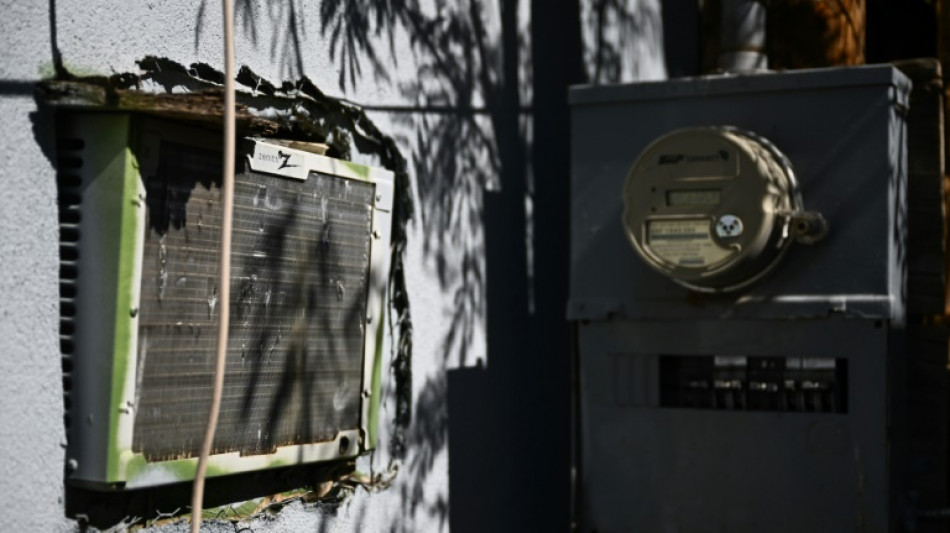
-
 South Korea's acting president faces impeachment vote
South Korea's acting president faces impeachment vote
-
Fleeing Myanmar, Rohingya refugees recall horror of war

-
 Smith century puts Australia in control of 4th Test against India
Smith century puts Australia in control of 4th Test against India
-
Israeli strikes hit Yemen as Netanyahu fires warning

-
 Peru ex-official denies running Congress prostitution ring
Peru ex-official denies running Congress prostitution ring
-
Australia's Smith reaches 34th Test century

-
 NHL Red Wings fire Lalonde and name McLellan as head coach
NHL Red Wings fire Lalonde and name McLellan as head coach
-
Injured Halep withdraws from Australian Open

-
 Liverpool power seven points clear, Man Utd crash at Wolves
Liverpool power seven points clear, Man Utd crash at Wolves
-
Leaders Liverpool survive Leicester scare to go seven points clear

-
 Membership of UK's anti-immigration Reform party surpasses Conservatives
Membership of UK's anti-immigration Reform party surpasses Conservatives
-
Two dead in treacherous Sydney-Hobart yacht race

-
 Amorim warns of 'long journey' ahead for miserable Man Utd
Amorim warns of 'long journey' ahead for miserable Man Utd
-
Three dead, four injured in Norway bus accident

-
 Man Utd fall to Wolves as Fernandes sees red
Man Utd fall to Wolves as Fernandes sees red
-
Fernandes sent off as Man Utd crash at Wolves, troubled Man City held by Everton

-
 'Logical' that fatigued Spurs are faltering - Postecoglou
'Logical' that fatigued Spurs are faltering - Postecoglou
-
Manmohan Singh: technocrat who became India's accidental PM

-
 India's former PM Manmohan Singh dies aged 92
India's former PM Manmohan Singh dies aged 92
-
Acid risk contained in deadly Brazil bridge collapse

-
 Chelsea stunned by Fulham in blow to Premier League title hopes
Chelsea stunned by Fulham in blow to Premier League title hopes
-
Troubled Man City held by lowly Everton, Chelsea title bid rocked

-
 Paterson, Bosch give South Africa edge over Pakistan in first Test
Paterson, Bosch give South Africa edge over Pakistan in first Test
-
Oil leak in Peru tourist zone triggers 'environmental emergency'

-
 Mozambique post-election violence kills 125 in three days: NGO
Mozambique post-election violence kills 125 in three days: NGO
-
Finns probing ship from Russia for 'sabotage' of cables

-
 Williams hits unbeaten 145 as Zimbabwe make Afghanistan toil
Williams hits unbeaten 145 as Zimbabwe make Afghanistan toil
-
Bowlers bring Pakistan back into first Test in South Africa

-
 Banbridge foils French to land King George VI Chase for Ireland
Banbridge foils French to land King George VI Chase for Ireland
-
Man City pay penalty for Haaland miss in Everton draw

-
 Paterson takes five wickets as Pakistan bowled out for 211
Paterson takes five wickets as Pakistan bowled out for 211
-
Kremlin cautions on 'hypotheses' over plane crash

-
 Pakistan military convicts 60 more civilians of pro-Khan unrest
Pakistan military convicts 60 more civilians of pro-Khan unrest
-
Turkey lowers interest rate to 47.5 percent

-
 Syria authorities launch operation in Assad stronghold
Syria authorities launch operation in Assad stronghold
-
Record number of migrants lost at sea bound for Spain in 2024: NGO

-
 Kohli called out over shoulder bump with Konstas during fourth Test
Kohli called out over shoulder bump with Konstas during fourth Test
-
Rural communities urged to flee east Australia bushfire

-
 Sri Lanka train memorial honours tsunami tragedy
Sri Lanka train memorial honours tsunami tragedy
-
S. Korea's opposition moves to impeach acting president

-
 'We couldn't find their bodies': Indonesian tsunami survivors mourn the dead
'We couldn't find their bodies': Indonesian tsunami survivors mourn the dead
-
Lakers pip Warriors after another LeBron-Curry classic

-
 India readies for 400 million pilgrims at mammoth festival
India readies for 400 million pilgrims at mammoth festival
-
Nepal hosts hot air balloon festival

-
 Asia stocks up as 'Santa Rally' persists
Asia stocks up as 'Santa Rally' persists
-
Tears, prayers as Asia mourns tsunami dead 20 years on

-
 Sydney-Hobart yacht crews set off on gale-threatened race
Sydney-Hobart yacht crews set off on gale-threatened race
-
Key public service makes quiet return in Gaza

-
 Fearless Konstas slams 60 as Australia take upper hand against India
Fearless Konstas slams 60 as Australia take upper hand against India
-
Hungry Sabalenka ready for more Slam success


In a warming world, is an air-conditioned future inevitable?
They are ubiquitous in the United States, controversial in Europe and coveted in South Asia. As heatwaves intensify across the world, air conditioning has taken center stage.
For better or for worse, these power-hungry appliances are among the most common adaptations to a warming world. They have become a necessary tool for the survival of millions, according to experts.
But while they bring immediate, life-saving relief, air conditioners come at a cost to the climate crisis because of their enormous energy requirements.
Air conditioning is responsible for the emission of approximately one billion metric tons of carbon dioxide per year, according to the International Energy Agency (IEA), out of a total of 37 billion emitted worldwide.
It is possible to end this vicious cycle, experts say, by increasing the contribution of renewable energies, developing less energy-intensive air conditioners and augmenting them with other cooling techniques.
"There are some real purists who think that we can eliminate, but I just don't think that's feasible," Robert Dubrow, a Yale epidemiologist who specializes in the health effects of climate change, told AFP.
Access to air conditioning already saves tens of thousands of lives a year, a figure that is growing, according to a recent IEA report co-authored by Dubrow.
Studies show that the risk of heat-related death is reduced by about three-quarters for those living in homes with an air conditioner.
In the United States, where about 90 percent of households have AC, studies have highlighted the role of air conditioning in protecting the population -- and the potentially devastating effect of widespread power cuts during heatwaves.
But globally, of the 3.5 billion people living in hot climates, only about 15 percent have air conditioners at home.
- High costs, high emissions -
The number of air conditioners in the world, about two billion today, is set to skyrocket as temperatures and incomes rise.
India, China and Indonesia -- the first, second and fourth most populous countries in the world -- are among those that will see the strongest growth.
By 2050, the share of households in India equipped with air conditioners could increase from 10 to 40 percent, according to a recent study.
But such an increase in electricity consumption would be equivalent to the current total annual production of a country like Norway.
If India's future grid uses as much fossil fuels as it does today, that would mean around 120 million tons more carbon dioxide emitted annually -- or 15 percent of the country's current energy sector emissions.
The problems posed by increased air conditioning do not stop there. Running power plants also causes air pollution.
Air conditioners also generally use fluorocarbon gases as refrigerants, which have a warming power thousands of times greater than CO2 when they escape into the atmosphere.
And by discharging their hot air out into the streets, air conditioning contributes to urban heat island effects.
A 2014 study found that at night heat emitted from air-conditioning systems in city centers increased the mean air temperature by more than 1 degree Celsius (almost 2F).
Finally, due to its cost, access to air conditioning poses a major equity issue.
Once installed, the price of the electricity bill can force families to choose between cooling and other essential needs.
- 'Complementary' solutions -
For Enrica De Cian, a professor in environmental economics at Ca Foscari University in Venice, the use of AC is "an important strategy in certain conditions and in certain places."
But, she adds, it's essential to combine it with "complementary" approaches.
First, by continuing to ramp up renewable energy production, and wind down fossil fuels, so that energy used by air conditioners leads to fewer emissions.
Second, by developing and installing affordable air conditioners that consume less energy, which some companies are working on. The IEA advocates for stricter efficiency standards, but also recommends air conditioners to be set at a minimum of 24C (75F).
Beyond limiting emissions, greater efficiency would also curb the risks of power cuts linked to excessive demand. On hot days, air conditioning can account for more than half of peak consumption.
But above all, the experts hammer home the simultaneous need for spatial planning measures: including more green spaces and bodies of water, sidewalks and roofs that reflect the Sun's rays, and better building insulation.
"We have to achieve sustainable indoor cooling," said Dubrow.
The proposed solutions are "very feasible," he adds. "It's a matter of political will for them to be implemented."
X.Brito--PC



